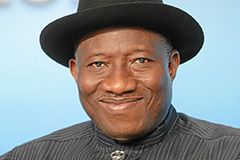- About
- Topics
- Picks
- Audio
- Story
- In-Depth
- Opinion
- News
- Donate
- Signup for our newsletterOur Editors' Best Picks.Send
Read, Debate: Engage.
Last night, the Iraqi government reported another attack by the IS on a national cultural monument in Namrid. There is evidence that IS and Boko Haram cooperate and influence the political stability in West Africa. As the elections in Nigeria show.
The German magazine SPIEGEL revealed, the "Islamic State" (IS) section in Iraq works together with the terrorist group Boko Haram in Nigeria. Official IS-propaganda sites call Nigeria as one of the countries in which an undisclosed group has joined the "Islamic state". According to SPIEGEL this is very likely Boko Haram. Who precisely coordinates this cooperation between the two terror groups is unclear. Already in July 2014 Boko Haram leader Abubakar Shekau has sworn fidelity to the IS-chief Abu Bakr al-Baghdadi. For a good reason. In the struggle with his rival, the jihad in Nigeria, Abubakar Shekau banks on the cooperation with the Iraqi-Syrian terrorists.
Boko Haram has factions in many parts of Africa. But terrorized mainly in its headquarters in Nigeria, and increasingly in neighbouring Cameroon. Repeatedly they shock with mass kidnappings and executions. The Islamists stormed a village and murdered there almost all men. An eye-witness counted more than 60 dead.
Islamists Nigerian terrorist group Boko Haram have again caused a bloodbath in the north of the country: According to eye-witnesses to many Islamists have attacked and killed almost all the men of the place.
The website "Sahara Reporters" quoted yesterday a woman who had fled from the northern village Njaba in the state of Borno with the words, they have counted over 60 corpses. The act has reportedly already occurred on Monday. Boko Haram’s attacks put a lot of pressure on the democratic election process in Nigeria. And on the incumbent President Goodluck Jonathan as well. The Independent National Electoral Commission (INEC) had postponed the general elections originally scheduled for February 14 and 21, to March 28 and April 11.
Goodluck Jonathan said in an interview with television channel Aljazeera, the security operatives do not guarantee a 100 per cent ouster of Boko Haram from the affected region before elections could be conducted, but want to ensure that their attacks do not disrupt elections. The President who is a member of the Peoples Democratic Party (PDP) is in the critics, especially through progress reports about the exploits of the military. Just recently President Goodluck Jonathan’s government turned down President Jacob Zuma’s proposal for a South Africa-inspired African Union (AU) rapid response to combat Boko Haram – yet apparently hired ex-South African Defence Force (SADF) soldiers to train the Nigerian Defence Force (NDF) to do so. “The government has failed to do its principle duty of protecting life or property of all beings inside its territory, in Nigeria.... The government is not serious about curbing the insurgency in the northeast”, says Muhammadu Buhari, the Nigeria's main opposition leader and election candidate of the All Progressives Congress (APC). He claims that the postponement of the elections is an attempt by President Goodluck Jonathan to buy time to secure his second presidency period. “I will not lose the election,” the president said when asked whether the decision to postpone the election was informed by the suspicion that he was afraid of losing if the election was held on the previous date.
The democratic process in Nigeria is put on hold by the questions: What is behind the delay? How big a threat is Boko Haram? And what is the security situation ahead of Nigeria's elections? Issues that play a fundamental role for the political stability in West Africa and their answers will show up in the next few weeks.
Photo: Goodluck Ebele Jonathan, President of Nigeria speaks during the televised session 'De-risking Africa - Achieving Inclusive Prosperity' at the Annual Meeting 2013 of the World Economic Forum in Davos, Switzerland, January 23, 2013. Copyright by World Economic Forum. . swiss-image.ch/Photo Remy Steinegger
